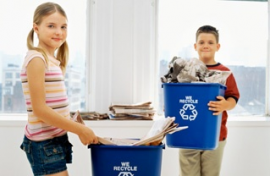At Printwaste we are working to educate the wider community, in a bid to demonstrate the importance of recycling and reduce waste among schools across Gloucestershire.
The future of our environment is highly dependent upon the understanding of the importance of recycling and upcycling. At Printwaste we believe that reinforcement of these views in schools and the wider community is key to supporting the diversion of waste from landfill. Educating the community can help change people’s attitudes towards re-use, which in turn should encourage them to reduce the amount of waste they produce in the first instance.
Our education system recognises that recycling is a crucial process for sustainability; but not everybody is motivated to recycle. Educating children in schools about the benefits of recycling encourages a grass-roots approach; in turn parents, siblings and friends are often more inclined to actively recycle. Here at Printwaste, we have a strong affinity with local schools, working to underpin waste reduction and recycling education, working with over 60,000 children in 250 Gloucestershire schools to date. The duty to educate lies with those who understand the benefits and can advocate good practice and reinforce a positive attitude to recycling. With the introduction of Personal Social Health and Citizenship Education (PSHCE), it is imperative that service providers work in partnership with teachers to further strengthen the importance of personal responsibility, whilst addressing the need to help achieve the Government’s green goals.
Delivering this message to the wider community is also important; fostering the understanding that recycling is a change in lifestyle which cannot be dictated. Industry experts need to take responsibility for changing attitudes and adopt a proactive approach to all practices; this will in turn provide people and businesses with the opportunity to take charge, look for the best value and do something with their own waste streams in order to reduce costs and improve attitude.
The financial and environmental benefits of recycling are numerous; by addressing concerns and misconceptions raised by the public such as, ‘What happens to the recyclate we have collected?’ and ‘Does it all get recycled?’ we can reinforce and improve public confidence, encouraging participation in kerbside collections for example. Manufacturing companies are beginning to recognise the value of recyclate as a future use material, providing additional demand for this waste; public awareness and empowerment affords the means to service this demand and education is key.
Ultimately, recycling plays a vital role in sustaining and conserving the environment, mitigating global warming and reducing pollution; through education we can begin to achieve these goals, maintain demand for waste materials and create employment opportunities.


